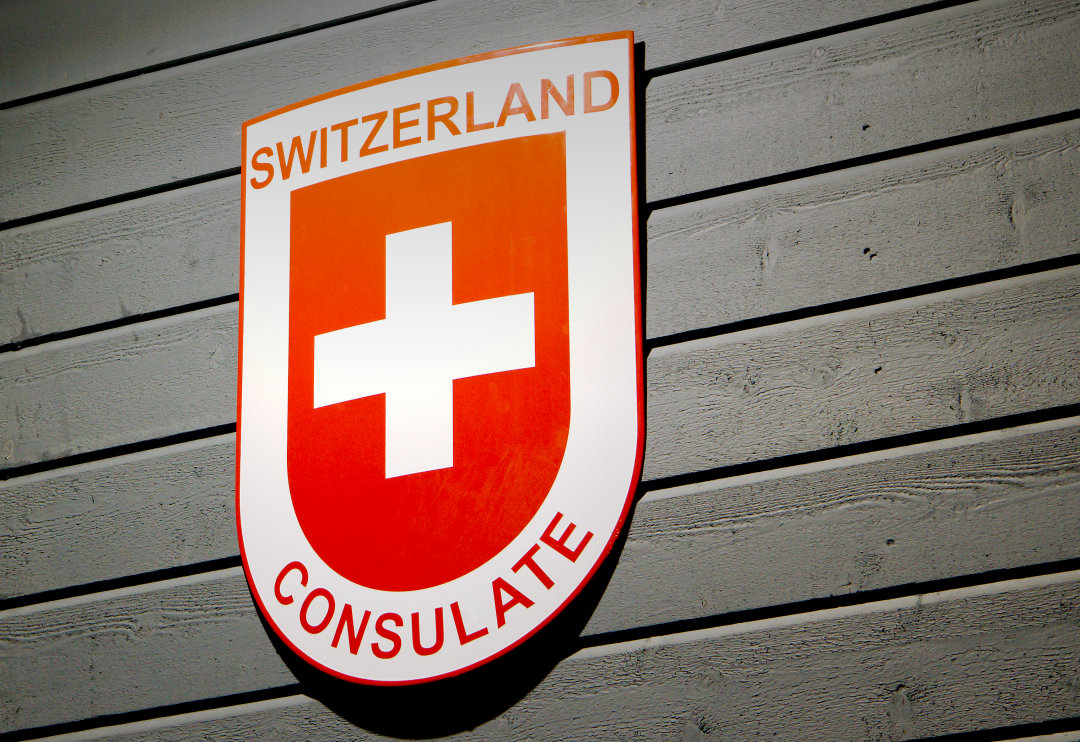

Switzerland Today
Dear Swiss Abroad,
Do you live in a remote location where an official Swiss representation is far away? If so, you may have already met an honorary Swiss consul – there are 218 worldwide.
In today’s briefing, learn more about the role of these "amateur diplomats", the dispute over the referendum against the electronic ID (e-ID), the death of a Swiss citizen in an Iranian prison, and challenges faced by Swiss police.
If, like me, you’re a fan of ski racing, there’s good news: the World Cup in Adelboden is just around the corner.
Enjoy your read, and best wishes!

Switzerland has 218 honorary consuls in 103 different countries – 20% more than 10 years ago.
According to Blick.ch, the federal government is increasingly appointing honorary consuls to represent Swiss interests in areas far from official embassies or consulates. These “amateur diplomats” assist Swiss citizens in need, represent Switzerland at events, and maintain relations with local authorities and businesses. Their roles are voluntary, with only limited compensation, but they do enjoy a degree of immunity while carrying out their duties.
Until now, their work has rarely been discussed in the federal parliament in Bern. This is changing: a Senate committee has commissioned an investigation into their activities, including foreign honorary consulates in Switzerland.
Blick.ch has some fascinating profiles of honorary consuls, including Khaled Juffali, a prominent businessman in Saudi Arabia; Astrid Boller, a health and beauty specialist in Belo Horizonte, Brazil; and Marcel Schütz, the first honorary consul in Longyearbyen, Spitsbergen, who aids stranded researchers in the High Arctic region. My colleague Bruno Kaufmann previously shared a portrait about Schütz which you can read in the link below.
- The Blick.chExternal link article about the honorary consuls
- The portrait on Marcel Schütz
More

E-ID referendum opponents clash over leadership
A few months ago the Pirate Party announced a referendum against the introduction of an electronic identity (e-ID) scheme. After its initial rejection at the ballot box, a revised e-ID bill was passed by the House of Representatives and Senate last autumn. Signatures against the planned introduction can be collected as of yesterday.
However, as reported by Tages-Anzeiger, the Pirate Party is not leading the opposition this time. Instead, the citizens’ association Mass-Voll, known for its previous opposition to pandemic measures, has taken centre stage, with backing from the far-right Junge Tat group. The Pirate Party has distanced itself from both organisations.
In 2021, around two-thirds of voters rejected the original e-ID proposal, but the new version addresses several points of criticism, including ensuring the state, not private entities, issues the e-ID. Former opponents have now switched sides to support the initiative, making it harder for current opponents to gather momentum.
- Article by the Tages-AnzeigerExternal link (paywall, in German)

Swiss citizen found dead in Iranian prison
A Swiss citizen has died in an Iranian prison, Iranian authorities confirmed to the Swiss foreign ministry.
According to Iranian state media, the incident took place in Semnan prison in the north-east of the country. “This morning, a Swiss citizen committed suicide in Semnan prison,” reported Mizan Online, the press organ of the Iranian judiciary. The prisoner had been arrested by the security authorities for alleged espionage. The case was under investigation at the time.
Critics accuse Tehran of using foreign detainees as political hostages, though Iran denies these allegations, often citing espionage as the reason for arrests.
European nationals, including those with dual Iranian citizenship, remain detained in Iran, though the exact numbers are unclear.
Concerns over espionage also exist closer to home. There have been suspicions of foreign intelligence activities at Swiss institutions like the federal technology institute ETH Zurich, with Austrian intelligence maintaining a list of researchers linked to the university.
- Full report by the Keystone-SDA on SWI swissinfo.ch (in English)
- Espionage at universities – the Swiss public television, SRF report
- Help with suicidal thoughts – for adultsExternal link and childrenExternal link

Swiss police face growing challenges despite increasing numbers
Switzerland’s police force has grown from 16,632 officers in 2011 to 20,298 in 2024, yet staff shortages and security issues persist.
Hundreds of vacancies remain, particularly in large cities such as in Zurich and in canton Basel City. However, smaller cantons like Schaffhausen are also affected, reports the Neue Zürcher Zeitung (NZZ).
Population growth, largely due to immigration, has increased demand for police services. However, since most police corps require Swiss citizenship, recruitment is further hindered, data given by the cantonal police shows.
Retirements and the growing complexity of police work exacerbate the issue, especially in specialised areas like IT and forensics, where private sector opportunities are more attractive.
- Full article in the Neue Zürcher Zeitung (NZZ)External link (paywall, in German).

Picture of the day
The World Cup ski races in Adelboden are back this weekend. But due to weather concerns, Saturday’s giant slalom and Sunday’s slalom have been switched. The change has disappointed some fans hoping to see Swiss ski star Marco Odermatt compete as planned.
Pictured above is Marco Odermatt following his victory in 2024.
Translated from German using DeepL/amva

In compliance with the JTI standards
More: SWI swissinfo.ch certified by the Journalism Trust Initiative


























